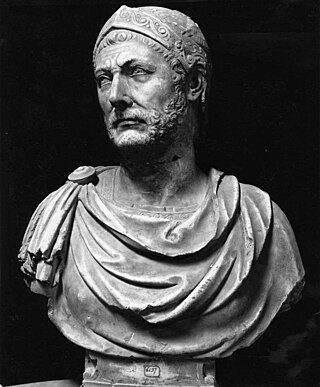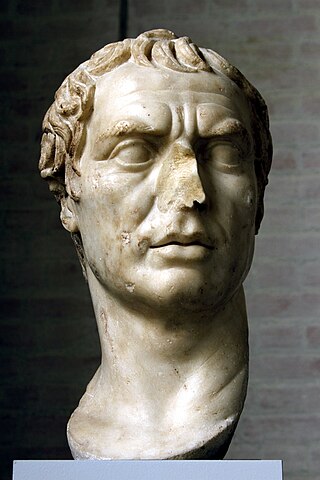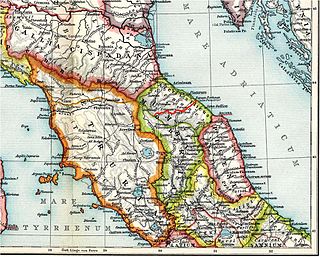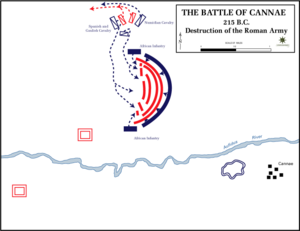
Hannibal was a Carthaginian general and statesman who commanded the forces of Carthage in their battle against the Roman Republic during the Second Punic War.
This article concerns the period 219 BC – 210 BC.
Year 211 BC was a year of the pre-Julian Roman calendar. At the time it was known as the Year of the Consulship of Maximus and Maximus. The denomination 211 BC for this year has been used since the early medieval period, when the Anno Domini calendar era became the prevalent method in Europe for naming years.
Year 215 BC was a year of the pre-Julian Roman calendar. At the time it was known as the Year of the Consulship of Albinus/Marcellus/Verrucosus and Gracchus. The denomination 215 BC for this year has been used since the early medieval period, when the Anno Domini calendar era became the prevalent method in Europe for naming years.

The Battle of Cannae was a key engagement of the Second Punic War between the Roman Republic and Carthage, fought on 2 August 216 BC near the ancient village of Cannae in Apulia, southeast Italy. The Carthaginians and their allies, led by Hannibal, surrounded and practically annihilated a larger Roman and Italian army under the consuls Lucius Aemilius Paullus and Gaius Terentius Varro. It is regarded as one of the greatest tactical feats in military history and one of the worst defeats in Roman history, and it cemented Hannibal's reputation as one of antiquity's greatest tacticians.

Publius Cornelius Scipio was a general and statesman of the Roman Republic and the father of Scipio Africanus.
Gnaeus Cornelius Scipio Calvus was a Roman general and statesman during the third century BC. He played a major part in the Second Punic War, establishing Roman rule in the east of the Iberian peninsula and tying up several Carthaginian armies to keep them from reinforcing Hannibal.
Lucius Aemilius Paullus Macedonicus was a two-time consul of the Roman Republic and general, who conquered Macedon in the Third Macedonian War.

Lucius Aemilius Paullus, also spelled Paulus, was a consul of the Roman Republic twice, in 219 and 216 BC. He is primarily remembered for being one of the commanders of the Roman army at the Battle of Cannae, and for his death in the same battle.
Mago Barca was a Carthaginian, member of the Barcid family, who played an important role in the Second Punic War, leading forces of Carthage against the Roman Republic in Iberia and northern and central Italy. Mago was the third son of Hamilcar Barca, was the brother of Hannibal and Hasdrubal, and was the brother-in-law of Hasdrubal the Fair.
Appius Claudius Pulcher was a Roman general and politician of the 3rd century BC, active in the Second Punic War.
Maharbal was a Numidian army commander in charge of the cavalry under Hannibal and his second-in-command during the Second Punic War. Maharbal was a very close friend to Hannibal and admired him greatly. He was often critical to the battlefield success of Carthage over Rome. Throughout his Italian campaign Hannibal maintained numerical superiority in cavalry, and thus relied upon them and Maharbal to give his army an advantage.
Marcus Junius Pera was a Roman politician before and during the Second Punic War.
Gaius Claudius Centho or Cento was a 3rd-century BC member of a prominent and wealthy patrician Roman Republican family. He was the third son of Appius Claudius Caecus, and a member of the Claudii. He was consul in the year 240 BC. He was Roman censor in 225, interrex in 217, and Roman dictator in 213.
This section of the timeline of Hispania concerns Spanish and Portuguese history events from the Carthaginian conquests to before the barbarian invasions.

Publius Cornelius Scipio Africanus was a Roman general and statesman, most notable as one of the main architects of Rome's victory against Carthage in the Second Punic War. Often regarded as one of the greatest military commanders and strategists of all time, his greatest military achievement was the defeat of Hannibal at the Battle of Zama in 202 BC. This victory in Africa earned him the honorific epithet Africanus, literally meaning "the African", but meant to be understood as a conqueror of Africa.
Publius Cornelius Scipio Asina was a Roman politician and general who served as consul in 221 BC, and as such campaigned against the Histri, a people in the northern Adriatic. Asina belonged to the Scipionic-Aemilian faction which dominated Roman politics at the beginning of the Second Punic War, and advocated for an aggressive policy against Hannibal. This stance led him to oppose the more prudent strategy of Fabius Maximus. He was notably appointed Interrex in 216 BC, probably in order to manipulate the elections.

The Battle of Silva Litana was an ambush that took place in a forest 75 miles northwest of the Roman city of Ariminum during the Second Punic War in 216 BC. The Gallic Boii surprised and destroyed a Roman army under the consul-elect Lucius Postumius Albinus. Of 25,000 Romans, only 10 survived, with a few being taken prisoner by the Gauls. The corpse of Postumius was decapitated and his skull was made into a gilded ceremonial cup by the Boii. News of this military disaster probably reached Rome after the defeat at Cannae in the fall of 216 BC or the spring election of consuls for 215 BC, triggering a renewed panic. The Romans were compelled to postpone military operations against the Gauls until the conclusion of the Second Punic War, sending only two legions to guard against additional Gallic attacks. However, the Boii and Insubres did not attempt to exploit their victory. Cisalpine Gaul remained in relative peace until 207 BC, when Hasdrubal Barca arrived there with his army from Spain.






